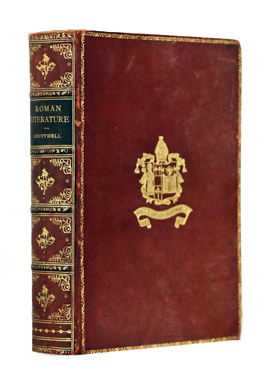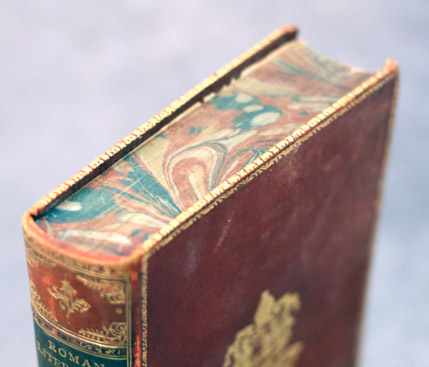CONTENTS.
INTRODUCTION.
Roman and Greek Literature have their periods of study—Influence of each —Exactness of Latin language—Greek origin of Latin literature—Its three great periods: (1) The Ante-Classical Period; (2) The Golden Age; (3) The Decline.
BOOK I
FROM LIVIUS ANDRONICUS TO SULLA (240-80 B.C.).
CHAPTER I.
On the Earliest Remains of the Latin Language.
Early inhabitants of Italy—Italic dialects—Latin—Latin alphabet—Later innovations—Pronunciation—Spelling—Early Monuments—Song of Fratres Arvales—Salian Hymn—Law of Romulus—Laws of Twelve Tables—Treaty between Rome and Carthage—Columna Rastrata —Epitaphs of the Scipios— Senatus Consultum de Bacchanalibus —Break-up of the language.
APPENDIX.—Examples of late corrupted dialects
CHAPTER II.
On the Beginnings of Roman Literature.
The Latin character—Romans a practical people—Their religion unromantic —Primitive culture of Latium—Germs of drama and epos—No early historians—Early speeches—Ballad literature—No early Roman epos—Poets despised—Fescenninae—Saturae—Mime or Planipes—Atellanae– Saturnian metre—Early interest in politics and law as giving the germs of oratory and jurisprudence.
CHAPTER III.
The Introduction of Greek Literature—Livius and Naevius (240-204 B.C.).
Introduction of Greek literature to Rome—Its first translators—Livius Andronicus—His translation of the Odyssey, Tragedies, &c.—Cn. Naevius—Inventor of Praetextae—Style—A politician—Writer of the first national epic poem—His exile and death—Cicero’s opinion of him— His epitaph.
CHAPTER IV.
Roman Comedy—Plautus to Turpilius (254-103 B.C.).
The Roman theatre—Plan of construction—Comedy—Related to Athenian Middle and New Comedy—Plautus—His plays—Their plots and style— Palliatae and Togatae—His metres—Caecilius—Admires Terence— Terence—His intimate friends—His style—Use of contamination—Lesser comedians.
CHAPTER V.
Roman Tragedy: Ennius—Accius (233-94 B.C.).
Contrast between Greek and Roman tragedy—Oratorical form of Latin tragedy—Ennius—The father of Roman poetry—His humamitas —Relations with Scipio—A follower of Pythagoras—His tragedies—Pacuvius—Painter and tragedian—Cicero’s criticism of his Niptra—His epitaph—L. Accius —The last tragic writer—A reformer of spelling.
APPENDIX.—On some fragments of Sueius or Suevius.
CHAPTER VI.
Epic Poetry: Ennius—Furius (200-100 B.C.).
Naevius and Ennius—Olympic deities and heroes of Roman story—Hexameter of Ennius—Its treatment—Matius—Hostius—Furius.
CHAPTER VII.
The Early History of Satire: Ennius to Lucilius (200-103 B.C.).
Roman satire a native growth—Origin of word “Saturae”—It is didactic—Not necessarily poetical in form—Ennius—Pacuvius—Lucilius— The objects of his attack—His popularity—His humility—His style and language.
CHAPTER VIII.
The Minor Departments of Poetry—The Atellanae (Pomponius and Novius, circ. 90 B.C.) and the Epigram (Ennius—Callus, 100 B. C.).
Atellanae—Oscan in origin—Novius—Pomponius—Mummius—Epigrammatists— Catulus—Porcius Licinius—Pompilius—Valerius Aedituus.
CHAPTER IX.
Prose Literature—History. Fabius Pictor—Macer (210-80 B.C.).
Early records—Annales, Libri Lintei, Commentarii, &c.—Narrow view of history—Fabius—Cincius Alimentus—Cato—Creator of Latin prose—His orations—His Origines—His treatise on agriculture—His miscellaneous writings—Catonis dicta —Calpurnius Piso—Sempronius Asellio—Claudius Quadrigarius Valerius Antias—Licinius Macer.
APPENDIX.—On the Annales Pontificum.
CHAPTER X.
The History of Oratory before Cicero.
Comparison of English, Greek, and Roman oratory—Appius-Cornelius Cethegus—Cato—Laelius—The younger Scipio—Galba—Carbo—The Gracchi— Self-praise of ancient orators—Aemilius Scaurus—Rutilius—Catulus—A violent death often the fate of a Roman orator—M. Antonius—Crassus—The Roman law-courts—Bribery and corruption prevalent in them—Feelings and prejudices appealed to—Cotta and Sulpicius—Carbo the younger— Hortensius—His friendship for Cicero—Asiatic and Attic styles.
CHAPTER XI.
Other kinds of Prose Literature: Grammar, Rhetoric, and Philosophy (147-63 B.C.).
Legal writers—P. Mucius Scaevola—Q. Mucius Scaevola—Rhetoric— Plotius Gallus—Cornificius—Grammatical science—Aelius Stilo— Philosophy—Amafinius—Rabirius—Relation of philosophy to religion.
BOOK II.
THE GOLDEN AGE. FROM THE CONSULSHIP OF CICERO TO THE DEATH OF AUGUSTUS (63 B.C.-l4 A.D.).
PART I.
THE REPUBLICAN PERIOD.
CHAPTER I.
Varro.
The two Divisions of this culminating period—Classical authors—Varro —His life, his character, his encyclopaedic mind—His Menippean Satires—Logistorici–Antiquities Divine and Human—Imagines—De Lingua Latina—De Re Rustica.
APPENDIX.—Note I. The Menippean Satires of Varro,
“ II. The Logistorici,
“ III. Fragments of Atacinus,
“ IV. The Jurists, Critics, and Grammarians of less note.
CHAPTER II.
Oratory and Philosophy—Cicero (106-43 B.C.).
Cicero—His life—Pro Roscio—In Verrem—Pro Cluentio—Pro lege Manilia—Pro Rabirio—Cicero and Clodius—His exile—Pro Milone—His Philippics—Criticism of his oratory—Analysis of Pro Milone—His Philosophy, moral and political—On the existence of God and the human soul—List of his philosophical works—His rhetorical works—His letters— His contemporaries and successors.
APPENDIX.—Poetry of M. and Q. Cicero.
CHAPTER III.
Historical and Biographical Composition—Caesar—Nepos—Sallust.
Roman view of history—Caesar’s Commentaries—Trustworthiness of his statements—His style—A. Hirtius—Other writers of commentaries—Caesar’s oratorical and scientific position—Cornelius Nepos—C. Sallustius Crispus—Tubero.
APPENDIX.—On the Acta Diurna and Acta Senatus.
CHAPTER IV.
The History of Poetry to the Close of the Republic—Rise of Alexandrinism—Lucretius—-Catullus.
The Drama—J. Caesar Strabo—The Mimae—D. Laberius—Publilius Syrus—Matius—Pantomimi—Actors—The poetry of Cicero and Caesar— Alexandria and its writers—Aratus—Callimachus—Apollonius Rhodius— Euphorion—Lucretius—His philosophical opinions and style—Bibaculus— Varro Atacinus—Calvus—Catullus—Lesbia.
APPENDIX.—Note I. On the Use of Alliteration in Latin Poetry,
“ II. Some additional details on the History of the Mimus,
“ III. Fragments of Valerius Soranus.
PART II.
THE AUGUSTAN EPOCH (42 B.C.-l4 A.D.).
CHAPTER I.
General Characteristics.
Common features of the Augustan authors—Augustus’s relation to them —Maecenas—The Apotheosis of the emperor—Rhetoricians not orators— Historians—Jurists—Poets—Messala—Varius—Anser—Macer.
CHAPTER II.
Virgil (70-19 B.C.)
Virgil—His earliest verses—His life and character—The minor poems —The Eclogues—The Georgics—Virgil’s love of Nature—His aptitude for epic poetry—The scope of the Aeneid —The Aeneid a religious poem —Its relation to preceding poetry.
APPENDIX.—Note I. Imitations of Virgil in Propertius, Ovid, and
Manilius,
“ II. On the shortening of final o in Latin poetry,
“ III. On parallelism in Virgil’s poetry,
“ IV. On the Legends connected with Virgil.
CHAPTER III.
Horace (65-8 B.C.).
Horace—His life—The dates of his works—Two aspects: a lyric poet and a man of the world—His Odes and Epodes—His patriotic odes—Excellences of the odes—The Satires and Epistles—Horace as a moralist—The Ars Poetica—Horace’s literary criticism—Lesser poets.
CHAPTER IV.
The Elegiac Poets—Gratius—Manilius.
Roman elegy—Cornelius Callus—Domitius Marsus—Tibullus—Propertius— Ovid—His life—The Art of Love —His exile—Doubtful and spurious poems —Lesser erotic and epic poets—Gratius—Manilius.
CHAPTER V.
Prose Writers of the Augustan Age.
Oratory Neglected—Declamation takes its place—Porcius Latro—Annaeus Seneca—History—Livy—Opportune appearance of his work—Criticism of his method—Pompeius Trogus—Vitruvius—Grammarians—Fenestella—Verrius Flaccus—Hyginus—Law and philosophy.
APPENDIX.—Note I. A Suasoria translated from Seneca,
“ II. Some Observations on the Theory of Rhetoric, from
Quintilian, Book III.
BOOK III.
THE DECLINE. FROM THE ACCESSION OF TIBERIUS TO THE DEATH OF M. AURELIUS, A.D. 14-180.
CHAPTER I.
The Age of Tiberius (14-37 A.D.).
Sudden collapse of letters—Cause of this—Tiberius—Changed position of literature—Vellius Paterculus—Valerius Maximus—Celsus—Remmius Palaemon—Germanicus—Phaedrus—Pomponius Secundus the tragedian.
CHAPTER II.
The Reigns of Caligula, Claudius, and Nero (37-68 A.D.).
1. Poets.
The Neronian period an epoch—Peculiar characteristics of its writers —Literary pretensions of Caligula—of Claudius—of Nero—Poem on Calpurnius Piso—Relation of philosophy to life—Cornutus—Persius—Lucan —Criticism of the Pharsalia —Eclogues of Calpurnius—The poem on Etna— Tragedies of Seneca—The apokolokuntosis.
CHAPTER III.
The Reigns of Caligula, Claudius, and Nero.
2. Prose Writers—Seneca.
His importance—Life and writings—Influence of his exile—Relations with Nero—His death—Is he a Stoic?—Gradual convergence of the different schools of thought—Seneca a teacher more than anything else—His conception of philosophy—Supposed connection with Christianity—Estimate of his character and style.
CHAPTER IV.
The Reigns of Caligula, Claudius, and Nero.
3. Other Prose Writers.
Domitius Corbulo—Quintus Curtius—Columella—Pomponius Mela— Valerius Protius—Petronius Arbiter—Account of his extant fragments.
APPENDIX.—
Note
I. The Testamentum Porcelli,
II. On the MS. of Petronius.
CHAPTER V.
The Reigns of the Flavian Emperors (69-96 A.D.).
1. Prose Writers.
A new literary epoch—Marked by common characteristics—Decay of national genius—Pliny the elder—Account of his death translated from the younger Pliny—His studious habits—The Natural History—Its character and value—Quintilian—Account of his book de Institutione Oratoria— Frontinus—A valuable and accurate writer—Grammatical studies.
APPENDIX.—Quintilian’s Criticism on the Roman Authors.
CHAPTER VI.
The Reigns of Vespasian, Titus, and Domitian (69-96 A.D.).
2. Poets.
Reduced scope of poetry—Poetry the most dependent on external conditions of any form of written literature—Valerius Flaccus—Silius—His death as described by Pliny—His poem—The elder Statius—Statius—An extempore poet—His public recitations—The Silvae—The Thebaid and Achilleid —His similes—Arruntius Stella—Martial—His death as recounted by Pliny —The epigram—Other poets.
APPENDIX.—On the Similes of Virgil, Lucan, and Statius.
CHAPTER VII.
The Reigns of Nerva and Trajan (96-117 A.D.).
Pliny the younger—His oratory—His correspondence—Letter to Trajan —Velius Longus—Hyginus—Balbus—Flaccus—Juvenal—His life—A finished declaimer—His character—His political views—Style—Tacitus—Dialogue on eloquence—Agricola— Germania—Histories—Annals —Intended work on Augustus’s reign—Style.
CHAPTER VIII.
The Reigns of Hadrian and the Antonines (117-180 A.D.).
Era of African Latinity—Differs from the Silver Age—Hadrian’s poetry —Suetonius—His life—List of writings—Lives of the Caesars—His account of Nero’s death—Florus—Salvius Julianus and Sextus Pomponius—Fronto— His relations with Aurelius—List of his works—Gellius—Gaius—Poems of the period—Pervigilium Veneris —Apuleius—De Magia—Metamorphoses or Golden Ass—Cupid and Psyche—His philosophical works.
CHAPTER IX.
State of Philosophical and Religious Thought during the Period of the Antonines—Conclusion.
Greek eloquence revives in the Sophists—Itinerant rhetors—Cynic preachers of virtue—The better class of popular philosophers—Dio Chrysostom—Union of philosophy and rhetoric—Greek now the language of general literature—Reconciliation of philosophy with religion—The Platonist school—Apuleius—Doctrine of daemons—Decline of thought— General review of the main features of Roman literature-Conclusion.
CHRONOLOGICAL TABLE
LIST OF EDITIONS RECOMMENDED
QUESTIONS OR SUBJECTS FOR ESSAYS, &c.




